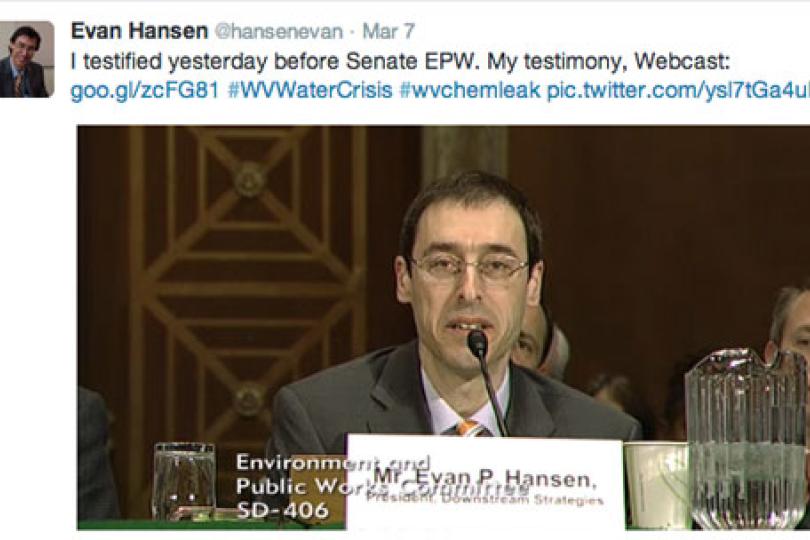How Twitter Can Lead to a Big Opportunity: 3 Lessons from @hansenevan
You work hard every day on issues affecting the health of residents in your state. You release reports about the dangers of fracking and other critical environmental issues. You try to link economic development with natural resource stewardship. You tweet and blog and host webinars to get the issues out to the public. But if you live in a state like West Virginia, you’re literally swimming upstream struggling for recognition of the big issues in the face of policymakers tied to a carbon-based future.
Then one day disaster strikes and you have a chance for your work to be thrust into the national spotlight. How do you capitalize on this Big Opportunity?
On January 9, 2014, thousands of gallons of a dangerous chemical were released into the Elk River. Switzer Fellow Evan Hansen (Twitter: @hansenevan) works for Downstream Strategies in Morgantown, West Virginia, which offers environmental consulting services. He immediately went to work on Twitter, posting tweets about the situation on the ground, deciphering documents for a lay audience, and posing questions about how this disaster happened and what policymakers need to do to prevent a repeat of it in the future. Evan’s hard work resulted in a chance to present his company's policy recommendations before the U.S. Senate Full Committee on Environment & Public Works in March 2014.
The three key lessons about building influence on Twitter that emerge are:
- Pick a niche and keep your tweets relevant to that niche. @hansenevan's niche is clear immediately: environmental issues in West Virginia. What is equally important is that Evan sticks closely to posts about that niche. You won’t find personal posts mixed into his Twitter stream, or even much of anything that isn’t directly about West Virginia.
- Start a dialogue and respond to questions in order to build trust and engagement. Even at the height of the crisis, Evan was available to lay people, media, and others (including a blog post for us at the Switzer Foundation!) for questions and responded quickly and thoroughly. This is critical in building trust and engagement on Twitter and elsewhere.
- Be ready for the Big Opportunity when it comes knocking. Evan has more than opinions, he has data. Downstream Strategies tested water for local residents and found contamination… after public health officials had already cleared those same residents to resume drinking their water. This is just one example of how Evan and his company were ready to respond when the media and policymakers started calling, which is critical if you are going to make the most of your Big Opportunity.
Evan is not an expert user of Twitter. In fact, for the first few years he was on Twitter, he posted sporadically and mostly retweets from @DownstreamStrategies, his company. By 2013 he was posting a few tweets per week on average about solar and other renewables projects in West Virginia, the future of coal mining in Appalachia, Downstream Strategies report releases, and other general economic posts regarding the state. He stuck to his niche and kept producing insightful reports and data analysis tools.
His Twitter stream started to heat up with an interesting series of live tweets from the Pringle Run watershed, with photos of conditions there, in September 2013. Then again in October 2013, he was tweeting more frequently when Downstream Strategies and Earthworks released a report about the impacts of fracking on water resources. This topic and report got a lot of attention from the media and policymakers across the country. I know our own Twitter traffic @switzernetwork increased exponentially as a result of retweets of the report and our webinar on fracking with Evan and Dustin Mulvaney, with the bump in traffic lasting through November.
There was a bit of a lull in December, and then the Elk River spill happened.
Evan posted an explosion of twenty tweets on January 12 alone about the region's Source Water Protection Plan and contamination sources in the Zone of Critical Concern. He started tagging his posts with #wvchemleak, making them easier to track.
Only Clean Water Act permit for Freedom Industries: 2009 industrial stormwater permit for Etowah River Terminal, WVG610920 #wvchemleak
Freedom permit: "The effluents...are to be of such quality so as to not cause violations of applicable water quality standards." #wvchemleak
While Freedom permit doesn't mention MCHM, it requires spill prevention and response procedures http://goo.gl/oHx54t #wvchemleak
Overnight @hansenevan became an excellent source of news from the area as it developed.
For the next week in mid-January, Evan posted a series of tweets about the discharge permit for Freedom Industries, including excellent tweets that offered context for the spill, callouts for specific information and documents, and finally offering independent water tests for MCHM with a phone number to call. He also posted live photos from the area, including the Freedom Industries site since the spill, a Charleston hotel’s warning against drinking the tap water, and more.
On January 17, an article in the Charleston Gazette quoted Evan’s Twitter feed:
Evan Hansen, an environmental consultant with the Morgantown firm Downstream Strategies, has been wondering for several days about whether the health studies and water sampling efforts included the other constituents of Crude MCHM.
Posting his thoughts on Twitter, Hansen said that the distinction between the two substances is important. "Are water tests in area being done for all constituents of Crude MCHM or just for 4-MCHM," Hansen posted.
At this point, the @hansenevan feed shifts into a different tone… that of an activist. On January 20, Evan posted:
State leaders need to stop anti-regulation rhetoric, protect human health, environment http://goo.gl/IpcxRt #WVWaterCrisis #wvchemleak
As our training partner COMPASS wrote in their blog post Two Myths and One Truth About Congressional Testimony, legislators don’t call you up to testify because you’re impartial, then call on you to testify because you suit a purpose. Evan’s Twitter feed reveals his opinions, based on fact, which it turns out is exactly what state policymakers need in light of the crisis. He was invited to testify before the West Virginia legislature on January 21 and 22, then appeared on HuffPost Live on January 23.
Evan continued to respond to questions and maintained a dialogue on his Twitter feed. On January 22, Kiley Kroh, Co-Editor of @climateprogress with Think Progress tweeted about Evan's testimony before the West Virginia legislature, and Evan resopnded to her the very next day with three tweets to provide additional information and context.
On February 4, Downstream Strategies released a summary of the data from their in-home tests, revealing that four in ten were still contaminated despite being cleared by health officials:
Summary of in-home tests by @DownstreamStrat: 4 of 10 samples detected MCHM, Jan 18-27, from flushed, purged taps #wvwatercrisis #wvchemleak
This was stunning news, and is the kind of data that gets the public's and policymakers’ attention.
While Evan’s tweets spent the rest of February watching SB 373 “the spill bill” make its way through West Virginia legislature and doing water tests, the wheels were turning elsewhere. In early March, Evan was invited to testify before the U.S. Senate Committee on Environment and Public Works… the Big Opportunity!
You can see Evan's testimony, along with that of Fellow Michael Wilson, and read more about the hearing in our coverage of the event.Evan’s Twitter feed alone didn’t land him this chance to testify, but Twitter certainly helped get his message out and establish him as knowledgable and credible. He picked his niche early and stuck to it throughout the crisis. He started a dialogue with followers and responded to questions in order to build trust and engagement. And when the Big Opportunity to testify before a U.S. Senate Committee came, Evan was ready.
We look forward to seeing where @hansenevan goes from here.. and of course the real Evan Hansen, too!
Additional resources:
- Why all scientists should blog: a case study (republished article on our site)
- Two Myths and One Truth About Congressional Testimony (republished article on our site)
- How Could Twitter Influence Science (And Why Scientists Are on Board) (link opens new window at Forbes.com)
- Evan Hansen and Mike Wilson: Working to achieve better worker and public safety in the face of industrial disasters (Featured Collaboration story on our site)

